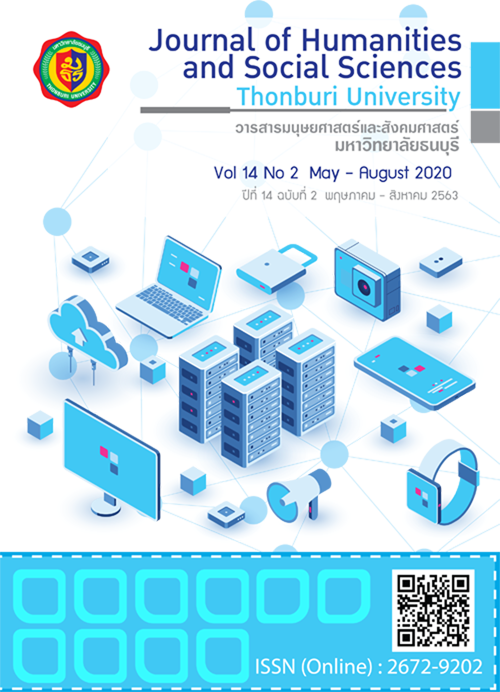รูปแบบการพัฒนาทักษะด้านอารมณ์โดยวิธีการเรียนรู้ด้วยตนเองสำหรับผู้ปฏิบัติงานส่วนหน้าในธุรกิจบริการ
คำสำคัญ:
ทักษะด้านอารมณ์, การเรียนรู้ด้วยตนเอง, ผู้ปฏิบัติงานส่วนหน้า, ธุรกิจบริการบทคัดย่อ
การวิจัยครั้งนี้มีวัตถุประสงค์ 1) เพื่อศึกษาองค์ประกอบทักษะด้านอารมณ์และองค์ประกอบการเรียนรู้ด้วยตนเองสำหรับผู้ปฏิบัติงานส่วนหน้าในธุรกิจบริการ 2) เพื่อพัฒนารูปแบบการพัฒนาทักษะด้านอารมณ์โดยวิธีการเรียนรู้ด้วยตนเองสำหรับผู้ปฏิบัติงานส่วนหน้าในธุรกิจบริการ 3) เพื่อประเมินการใช้คู่มือการพัฒนาทักษะด้านอารมณ์โดยวิธีการเรียนรู้ด้วยตนเองสำหรับผู้ปฏิบัติงานส่วนหน้าในธุรกิจบริการ กลุ่มตัวอย่าง คือ ผู้ปฏิบัติงานส่วนหน้าในธุรกิจบริการตอบแบบสอบถามจำนวน 331 คน เครื่องมือที่ใช้ในการวิจัย ได้แก่ แบบสัมภาษณ์และแบบสอบถาม ผลการวิจัยพบว่า องค์ประกอบของทักษะด้านอารมณ์ที่จำเป็นต่อผู้ปฏิบัติส่วนหน้าในธุรกิจบริการ มีทั้งหมด 10 ทักษะ ได้แก่ 1) ด้านการสื่อสาร 2) ด้านการคิดวิเคราะห์และแก้ปัญหา 3) ด้านความคิดสร้างสรรค์และปฏิภาณไหวพริบ 4) ด้านการทำงานเป็นทีม 5) ด้านการเจรจาต่อรอง 6) ด้านการจัดการกับเวลาและการทำงานภายใต้แรงกดดัน 7) ด้านการเรียนรู้และการจัดการกับข้อมูล 8) ด้านความเป็นผู้นำ 9) ด้านจรรยาบรรณในวิชาชีพ 10) ด้านทัศนคติเชิงบวกในการทำงาน และองค์ประกอบของการเรียนรู้ทักษะด้านอารมณ์ด้วยตนเอง ประกอบด้วย 4 องค์ประกอบหลัก ได้แก่ 1) วิเคราะห์ความต้องการหรือความจำเป็น 2) กำหนดเป้าหมาย 3) หาวิธีการเรียนรู้ด้วยตนเอง 4) ประเมินผลการเรียนรู้
เอกสารอ้างอิง
เกรียงไกรยศ พันธุ์ไทย. (2552). กรอบแนวคิดการพัฒนาทรัพยากรมนุษย์เชิงกลยุทธ์. วารสารเศรษฐศาสตร์และบริหารธุรกิจ มหาวิทยาลัยทักษิณ. 4(1): 13–24.
จีระวัฒน์ ยุวอมรพิทักษ์. (2544). ลักษณะการเรียนรู้ด้วยการนําตนเองของนักศึกษาชั้นปริญญาตรีมหาวิทยาลัยรามคําแหง สาขาวิทยบริการเฉลิมพระเกียรติ. การศึกษามหาบัณฑิต, มหาวิทยาลัยรามคําแหง.
ชโลทร โชติกีรติเวช และวัลลภา อารีรัตน์. (2560). ความต้องการจำเป็นในการพัฒนาทักษะ Soft Skills เพื่อการจัดการเรียนรู้ของครูในสถานศึกษาสังกัดสำนักงานเขตพื้นที่การศึกษามัธยมศึกษา เขต 25. วารสารวิจัยมหาวิทยาลัยขอนแก่น. (ฉบับบัณฑิตศึกษา) สาขามนุษยศาสตร์และสังคมศาสตร์. 5(1): 44–52.
ธนาคารโลกประจำประเทศไทย. (2559). รายงานตามติดเศรษฐกิจไทย (ธันวาคม 2559) ภาคบริการจะเป็นปัจจัยใหม่ที่ขับเคลื่อนการเติบโตทางเศรษฐกิจ. สืบค้นเมื่อ 14 กรกฎาคม 2561, จาก https://www.worldbank.org/th/country/ thailand/publication/thailand-economic-monitor-december-2016
ธีรวุฒิ เอกะกุล. (2543). ระเบียบวิธีวิจัยทางพฤติกรรมศาสตร์และสังคมศาสตร์. อุบลราชธานี: สถาบันราชภัฎอุบลราชธานี.
ปรวัน แพทยานนท์. (2560). การศึกษาบทบาทและทัศนะต่อลักษณะอันพึงประสงค์ของผู้ฝึกนักแสดงภาพยนตร์. วารสารวิชาการนวัตกรรมสื่อสารสังคม. 5(2): 168-175.
ประอรพิชญ์ คัจฉวัฒนา. (2561). ทักษะ Soft Skill ช่วยรอดจากยุค AI ครองเมืองที่เด็กทศวรรษนี้ต้องมี. สืบค้นเมื่อ 26 กรกฎาคม 2561, จาก https://www.salika.co/2018/06/01/soft-skill-for-digital/
พัชรี สร้อยสกุล. (2559). การพัฒนาทักษะแห่งศตวรรษที สำหรับนักศึกษาอาชีวศึกษาเอกชนในเขตพัฒนาอุตสาหกรรมชายฝังทะเลตะวันออก. การศึกษาดุษฎีบัณฑิต, มหาวิทยาลัยบูรพา.
พิมพ์พรรณ เทพสุเมธานนท์; และ สุวพิชชา ประสิทธิธัญกิจ. (2553). การเรียนรู้ด้วยการนําตนเองของนักศึกษา ภาควิชาพื้นฐานการศึกษา คณะศึกษาศาสตร์มหาวิทยาลัยรามคําแหง. กรุงเทพฯ : มหาวิทยาลัยรามคําแหง.
Griffin, C. (1983). Curriculum Theory in Adult Lifelong Education. London : Crom Helm.
Jones, P. (2017). Top 10 Skills You Need for a Career in Customer Service. Retrieved Jun 3, 2018, from https:// www.thejobnetwork.com/top-10-skills-you-need-for-a-career-in-customer-service/
Knowles, M. (1975). Self-directed Learning: A Guide for Learners and Teachers. Chicago : Association Press.
Mitchell, G. W., et al. (2010). Essential Soft Skills for Success in the Twenty-first Century Workforce as Perceived by Business Educators. Delta Pi Epsilon Journal. 52(1): 43-53.
Translated Thai References
Chotikeerativatch, C. =;& Ariratana, W. (2017). Needs Assessment for Soft Skills Development in Teachers’ Learning Management in Schoolsunder The Secondary EducationalService Area Office 25. KKU Research Journal Humanities and Social Sciences (Graduate Studies). 5(1): 44–52. (in Thai)
Ekakun, T. (2000). Research Methodology in Behavioral Sciences and Social Sciences. Ubon Ratchathani: Ubon Ratchathani Rajabhat University. (in Thai)
Khitchawattana, P. (2018). Children of this decade must have Soft Skill to help survive the era of the dominating AI. Retrieved July 26, 2018, from https://www.salika.co/2018/06/01/soft-skill-for-digital/ (in Thai)
Pattayanon, P. (2017). A Study of Role and Attitude towards Desired Characteristic of Acting Coach for Thai Film. The Journal of Social Communication Innovation. 5(2): 168-175. (in Thai)
Phanthai, K. (2009). Model of Strategic Human Resource Development. Economics and Business Administration Journal Thaksin University. 4(1): 13–24. (in Thai)
Soisakul, P. (2016). Developing the 21 century skills for vocational students in the private vocational institutes in eastern seaboard area. (Doctor of Education Dissertation, Burapha University). (in Thai).
The World Bank. (2018). Thailand Economic Monitor – December 2016: Services as a New Driver of Growth. Retrieved July 14, 2018, from https://www.worldbank.org/th/country/thailand/ publication/thailand-economic-monitor-december-2016 (in Thai)
Thepsumethanon, P.;& Prasitthanyakit, S. (2010). Self-directed learning of the Department of Educational Foundation Students, Faculty of Educationat Ramkhamhaeng University. Bangkok: Ramkhamhaeng University. (in Thai)
Yuwamornpitak, C. (2001). Self-guided learning characteristics of Ramkhamhaeng University undergraduate students Chalermprakiet Academic Resources. (Master of Education Thesis, Ramkhamhaeng University). (in Thai)







